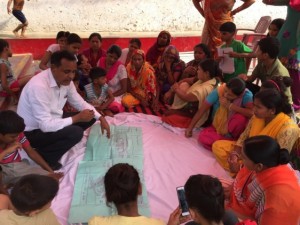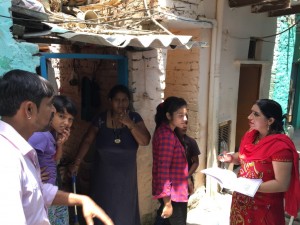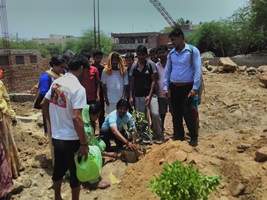
Responsible action for community
Social Project
Social Project “WASH”
REWE Far East and Save the Children have entered into a partnership in December 2016. Since then, REWE Far East has supported the project entitled “Promotion of Safe Water, Hygiene and Sanitation (WASH) in the Slums of Delhi”, which will be implemented by Save the Children in three slum clusters in India’s capital city from 2016 to 2019.
The project combines infrastructural rehabilitation and construction with community sensitization and trainings in positive hygiene behavior and practices. This is vital in order to ensure a sustainable impact, as insufficient access to clean drinking water, inadequate provision of sanitary services as well as a lack of hygiene education are among the leading causes for the high child mortality rate among the marginalized population in informal settlements in Delhi. In fact, these are also some of the reasons why India still ranges among the countries with the highest child mortality rates among children under five in the world due to diarrheal diseases – which are entirely preventable. At the same time, a lack of safe drinking water and sanitation has been shown to influence not only health, but by extension also lead to poorer outcomes among socio-economic indicators such as education, food security, continued poverty and economic hardship due to more frequent sickness of earning family members. An improvement of basic sanitation, including for instance regular hand washing with soap, can reduce the amount of deadly diarrheal infections by two thirds.
The goal of the project is therefore to provide children and their families in Delhi with access to clean drinking water, sanitary infrastructure as well as sensitize and inform them about hygienic behavior. Especially children are taught proper every-day hygienic practices and corresponding health implications mainly at primary schools and government facilitated development centers (ICDS Centers). These include, for instance, 6 steps of hand washing and important times for hand washing, such as before meals and after using the toilet. Additionally, sanitary and toilet facilities as well as hand washing stations will be built and rehabilitated.
REWE Far East in cooperation with Save the Children wants to ensure the sustainability of the project’s benefits for the people of Delhi. For this reason, community members are closely integrated into the identification, planning, organization and implementation of project activities so as to ensure a high degree of ownership that will last beyond the project life span. Furthermore, the toilet complexes built and rehabilitated as part of the project will be handed over to the community, who will be trained in their management and maintenance and will then be able to turn them into a source of revenue for the slum cluster. And finally, the project flexibly adapts to local conditions – as for instance in the case of the portable child-friendly bio-digester toilets, which were identified as ideal models to suit severe space constraints and frequent change of location that the government youth development centers are often faced with.
By June 2017, within the first 7 months of the project, REWE Far East and Save the Children were able to reach 3,695 children and 3,818 adults through our project activities. Another fantastic success were several events and celebrations held to raise awareness and sensitize the community members, such as promotion camps for improved health conditions in which a total of 142 children participated, street plays and awareness rallies which were attended by 450 people including 200 children and celebrations of special events such as the “World Water Day” together with a total of 500 families.

© Save the Children India

© Save the Children India

